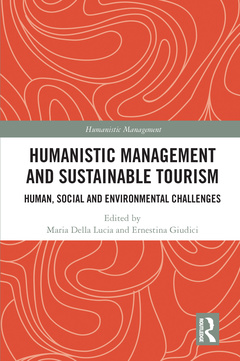Humanistic Management and Sustainable Tourism Human, Social and Environmental Challenges Humanistic Management Series

Tourism is a fast-growing and changing industry, which has become a driver of economic development in both developed and underdeveloped countries. While the tourism industry?s potential for shared value creation and sustainable development is acknowledged, the concerns around the environmental and social pressures remain a challenge for businesses, organizations, and destinations. This is because sustainable tourism arguably conflicts with the predominant neoliberal structure of the economy and with the hierarchical, profit- and consumption-driven societies. The emphasis on competition, growth, and profitability may undermine economic viability itself by consuming unreproducible resources and by undermining the six essential elements?dignity, people, prosperity, social justice, planet, and partnership?that are conceptually linked to sustainable development. The crises recurrently challenging the global travel and tourism environment, including climate change, bushfires, extreme weather disasters, pandemics, and the financial crisis, show the weaknesses of neoliberal approaches and the collective economic dependency of countries on tourism that is vulnerable, if not completely unsustainable. This vulnerability asks for understanding that the collective future depends on developing entirely new approaches and interpretation of tourism to effectively respond to the human, societal, social, and climate challenges.
This book offers a novel and original perspective entailing the application of a humanistic management approach to sustainable tourism, which is centered on the value of human life, the protection of human dignity and the promotion of well-being. Multiple theoretical approaches, methods, and practical cases, on an international scale, shed light on shared value creation and human dignity as a necessary condition for its achievement in different contexts. Implicitly and explicitly, they respond to the current urgency to implement strategies to recover from the worldwide impact of the pandemic crisis and to provide a vision of what tourism could and should be when it recovers. It will be of interest to researchers, academics, professionals, and postgraduates in the fields of management, sustainability, and tourism development.
1. The Capitalist Dilemma in Modern Tourism Development
Part 1: Stakeholder Cooperation for Socio-economic Development
2. The Seven Sisters of Piedmont: A Case Study of Potentially Worthwhile Cooperation
3. Do Socially Responsible Tour Operators Improve Tourism Sustainability? The Case of Nairobi, Kenya
4. Sharing Economy in Peripheral Tourism Destinations: The Case of Finnish Lapland
Part 2: New Business Models for Creating Shared Value
5.Application of Slow Life Coaching into Agritourism Business Model
6. Cultural Heritage Triggering Corporate Investments: "Heritage Grab" or Sustainable Development?
7. Creative Tourism: A Humanistic Paradigm in Practice
8. A Bloody Past with a Bright Future: Dark Tourism and Humanistic Management at Missouri State Penitentiary
Part 3: The Influence of Cultural Context
9. A Grounded Theory Study of Ethnic Tourism in Hainan, China
10. Positive Impacts of Sustainable Tourism: Preservation of Historical Languages and Practices
11. Spontaneous Tourism and Sustainable Development. The Evolution of the City of Naples
12. Everyday and Holiday Behaviours Regarding Sustainable Consumption Choices. Humanistic Managerial Perspectives for an International Destination
13. Memorable Experiences in Slow Tourism: An Empirical Investigation in Camping
Part 4: Conclusion
14. Lessons for Shared Value Creation in Tourism: The Pandemic Challenge
Maria Della Lucia is Associate Professor of Tourism and Business Management at the University of Trento, Italy. Her main areas of research, teaching, and training include local development and sustainability, destination management and governance, culture-led regeneration, creative cities and creative tourism, digital and social media marketing, and economic impact analysis as investment decision making tools. She has published her research in prominent journals.
Ernestina Giudici is a retired Full Professor of Management and Business Communication at the University of Cagliari, Italy. Her main areas of research include business communication, storytelling and digital storytelling, humanistic management and integrity, corruption, ethical sustainable development, sustainability, and neurotourism. She is part of the managing team of the International Humanistic Management Association and has published widely in various prestigious journals.
Date de parution : 08-2022
15.2x22.9 cm
Date de parution : 02-2021
15.2x22.9 cm
Thèmes de Humanistic Management and Sustainable Tourism :
- direction / stratégie d'entreprise
- Initiation à l'économie, théories et études économiques
- Économies et politiques économiques mondiales : relations économiques internationales / douanes, exportation
- analyse, budget, trésorerie, financement, investissement, gestion prévisionnelle
- gestion du personnel et des ressources humaines - relations humaines - formation - salaires - ergonomie
Mots-clés :
Slow Tourism; Humanistic Management; sustainable tourism; Follow; environmental challenges; Sustainable Tourism Development; personal/social well-being; Face To Face; human dignity; Environmental Issues; Tourism Operators; DMO; Land Grab Literature; Memorable Tourism Experience; Eco-friendly Services; Literature Review; Creative Tourism; Sharing Economy; Socio-economic Development; Della; Dark Tourism; Ethnic Tourism; Ethnic Tourism Development; Unforgettable; Spontaneous Tourism; Agritourism Services; Tourism Development; Tourism Experiences



